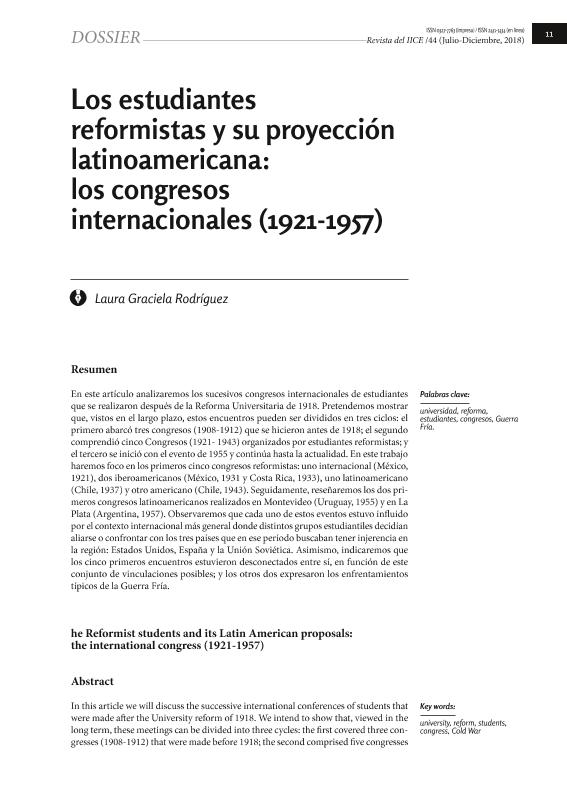Mostrar el registro sencillo del ítem
dc.contributor.author
Rodríguez, Laura Graciela

dc.date.available
2020-02-27T19:43:49Z
dc.date.issued
2018-12-01
dc.identifier.citation
Rodríguez, Laura Graciela; Los estudiantes reformistas y su proyección latinoamericana: los Congresos Internacionales (1921-1957); Universidad de Buenos Aires. Facultad de Filosofía y Letras. Instituto de Investigaciones en Ciencias de la Educación; Revista del IICE; 44; 1-12-2018; 11-24
dc.identifier.issn
0327-7763
dc.identifier.uri
http://hdl.handle.net/11336/98522
dc.description.abstract
En este artículo analizaremos los sucesivos congresos internacionales de estudiantes que se realizaron después de la Reforma Universitaria de 1918. Pretendemos mostrar que, vistos en el largo plazo, estos encuentros pueden ser divididos en tres ciclos: el primero abarcó tres congresos (1908- 1912) que se hicieron antes de 1918; el segundo comprendió cinco Congresos (1921- 1943) organizados por estudiantes reformistas; y el tercero se inició con el evento de 1955 y continúa hasta la actualidad. En este trabajo haremos foco en los primeros cinco congresos reformistas: uno Internacional (México, 1921), dos Iberoamericanos (México, 1931 y Costa Rica, 1933), uno Latinoamericano (Chile, 1937) y otro Americano (Chile, 1943). Seguidamente, reseñaremos los dos primeros Congresos Latinoamericanos realizados en Montevideo (Uruguay, 1955) y en La Plata (Argentina, 1957). Observaremos que cada uno de estos eventos estuvo influido por el contexto internacional más general donde distintos grupos estudiantiles decidían aliarse o confrontar con los tres países que en ese período buscaban tener injerencia en la región: Estados Unidos, España y la Unión Soviética. Asimismo, indicaremos que los cinco primeros encuentros estuvieron desconectados entre sí, en función de este conjunto de vinculaciones posibles; y los otros dos expresaron los enfrentamientos típicos de la Guerra Fría.
dc.description.abstract
In this article we will discuss the successive international conferences of students that were made after the University reform of 1918. We intend to show that, viewed in the long term, these meetings can be divided into three cycles: the first covered three congresses (1908-1912) that were made before 1918; the second comprised five congresses (1921-1943) organized by reformist students; and the third began with the 1955 event and continues to the present day. These events were direct product of the Argentinean University Reform of 1918. In the first paragraphs, I will reference to the five Congress: one International (México, 1921), two Ibero-American (México, 1931 and Costa Rica, 1933), one Latin American (Chile, 1937) and other American (Chile, 1943). Then, I will describe the others two: Latin-American Congress situated in Montevideo (Uruguay, 1955) and La Plata (Argentina, 1957), which maintained some continuity until today. I will show that each of these events was influenced for the international context where different groups of students decided to ally or confront with the three important countries that were disputed the region: United States, Spain and Soviet Union. Finally, I will also indicate that the first five events were disconnected between each other, and the other two expressed the typical confrontations of the Cold War.
dc.format
application/pdf
dc.language.iso
spa
dc.publisher
Universidad de Buenos Aires. Facultad de Filosofía y Letras. Instituto de Investigaciones en Ciencias de la Educación

dc.rights
info:eu-repo/semantics/openAccess
dc.rights.uri
https://creativecommons.org/licenses/by-sa/2.5/ar/
dc.subject
UNIVERSIDAD
dc.subject
REFORMA
dc.subject
ESTUDIANTES
dc.subject
CONGRESOS
dc.subject
GUERRA FRÍA
dc.subject.classification
Otras Ciencias de la Educación

dc.subject.classification
Ciencias de la Educación

dc.subject.classification
CIENCIAS SOCIALES

dc.title
Los estudiantes reformistas y su proyección latinoamericana: los Congresos Internacionales (1921-1957)
dc.title
The Reformist students and its Latin American proposals: the international congress (1921-1957)
dc.type
info:eu-repo/semantics/article
dc.type
info:ar-repo/semantics/artículo
dc.type
info:eu-repo/semantics/publishedVersion
dc.date.updated
2019-10-16T14:30:39Z
dc.identifier.eissn
2451-5434
dc.journal.number
44
dc.journal.pagination
11-24
dc.journal.pais
Argentina

dc.journal.ciudad
Buenos Aires
dc.description.fil
Fil: Rodríguez, Laura Graciela. Consejo Nacional de Investigaciones Científicas y Técnicas. Centro Científico Tecnológico Conicet - La Plata. Instituto de Investigaciones en Humanidades y Ciencias Sociales. Universidad Nacional de La Plata. Facultad de Humanidades y Ciencias de la Educación. Instituto de Investigaciones en Humanidades y Ciencias Sociales; Argentina. Universidad Nacional de la Plata. Facultad de Humanidades y Ciencias de la Educación. Departamento de Sociología; Argentina
dc.journal.title
Revista del IICE
dc.relation.alternativeid
info:eu-repo/semantics/altIdentifier/url/http://revistascientificas.filo.uba.ar/index.php/iice/article/view/6285
dc.relation.alternativeid
info:eu-repo/semantics/altIdentifier/doi/https://doi.org/10.34096/riice.n44.6285
Archivos asociados
